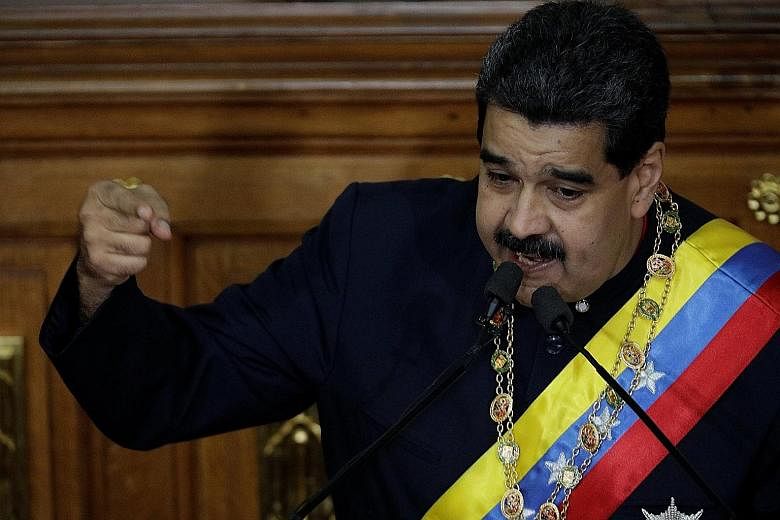When his mentor and predecessor, Mr Hugo Chavez, died in 2012, Venezuela's President Nicolas Maduro continued the free-spending socialist revolution policies started by Mr Chavez in 2000.
Over the years, however, those policies meant to help the poor and less-educated classes have left the Venezuelan economy in a shambles and ramped up poverty and crime.
With oil prices half of what they were three years ago in a country dependent on oil for 95 per cent of its export earnings, and triple-digit inflation, Mr Maduro held a contentious election on July 30 that enabled him to install a new governing body that has given him a lock on power. Not only that, it has also abolished presidential term limits, nationalised much of the oil industry and begun land redistribution.
Mr Maduro, now 54, is no stranger to political turmoil - he was born in 1962, an era when revolution roiled Latin and Central American countries. His own father was a union leader and involved in the leftist movement.
Growing up in the tough, blue-collar El Valle neighbourhood on the outskirts of Caracas, his classmates at Jose Avalos high school say they remember the young Maduro as a tall and imposing teen who gave clipped but forceful speeches about students' rights - and had already begun grooming his now trademark bushy moustache.
The Guardian reports Mr Grisel Rojas, 50, a schoolmate who is now the principal, as saying of Mr Maduro: "He would address us during the assembly to talk about students' rights and that sort of thing. He didn't speak much, and wasn't agitating people into action, but what he did say was usually poignant."
Records show that he never graduated, the paper said, and as a rock music fan, especially of Led Zeppelin, he first thought of joining a rock band. His other interest - left-wing politics - took him to Cuba instead, where he trained as an organiser, according to the Encyclopaedia Britannica.
Later, while working as a bus driver in Caracas, he became a leader in its transit workers union and joined the Socialist League.
In 1992, Mr Maduro and a young lawyer, Ms Cilia Flores, who would become his wife in 2013, campaigned for the release of Mr Chavez after he was jailed for an attempted coup. She later became Venezuela's attorney-general, and was subsequently First Lady.
Mr Maduro became increasingly involved with the Movement of the Fifth Republic, which rallied behind Mr Chavez's successful presidential run in 1998. Mr Maduro rose through the ranks of the PSUV (Venezuela's socialist party), and became foreign minister in 2006.
He made global headlines when he and his boss distanced Venezuela from the United States, befriending notorious figures such as Zimbabwe's Mr Robert Mugabe, Iran's Mr Mahmoud Ahmadinejad and Libyan dictator Muammar Gaddafi.
At a regional summit in 2007, Mr Maduro, responding to US criticism, compared its treatment of suspected terrorists at Guantanamo to the atrocities committed by Hitler, the Guardian reported.
Mr Maduro continued his anti-US antics after becoming president by expelling American diplomats. He also accused "historical enemies" of having poisoned Mr Chavez.
But by June last year, his government was forced to declare a state of emergency as the economy tanked - with minus 8 per cent growth, inflation at 482 per cent and 17 per cent unemployment.
In December, The Independent reported that the situation had got so bad that Venezuelans were giving away their children to survive.
The growing chaos resulted in five months of protests against Mr Maduro's administration this year, leaving more than 100 dead and prompting analysts to predict the certain collapse of his presidency.
Then came the election power play on July 30 that prompted a rebuke even from US President Donald Trump.
Mr Maduro, he said, is a "bad leader who dreams of becoming a dictator".

